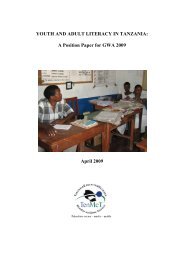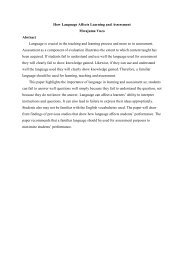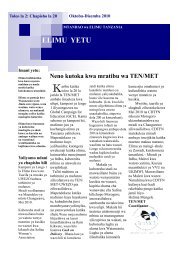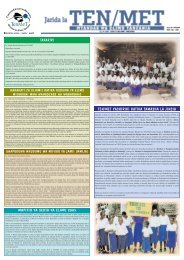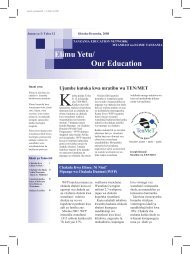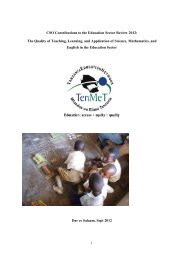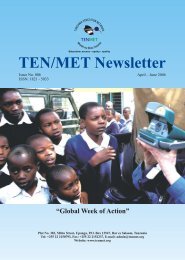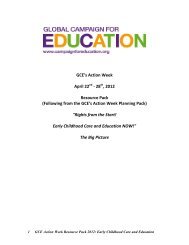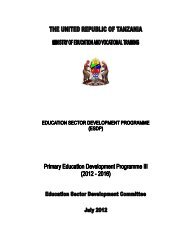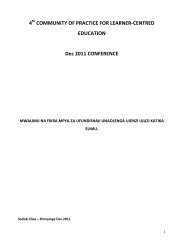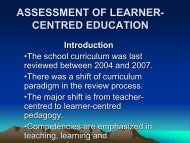Status of Children in Tanzania - 2012 - Tanzania Education Network ...
Status of Children in Tanzania - 2012 - Tanzania Education Network ...
Status of Children in Tanzania - 2012 - Tanzania Education Network ...
Create successful ePaper yourself
Turn your PDF publications into a flip-book with our unique Google optimized e-Paper software.
Call for Action<br />
<strong>in</strong>volved <strong>in</strong> housekeep<strong>in</strong>g and 32.4% are <strong>in</strong> both economic and housekeep<strong>in</strong>g while 1.1% are<br />
entirely <strong>in</strong> economic activities. In rural areas children are seriously affected by poverty that<br />
contributes to poor access to social services and social protection. As noted by REPOA 2010,<br />
poverty affects more than 50% <strong>of</strong> children <strong>in</strong> rural areas who are surviv<strong>in</strong>g without any <strong>in</strong>come<br />
generat<strong>in</strong>g activities at their households.<br />
Child poverty.<br />
Child poverty is reflected by lack <strong>of</strong> the basic needs required for healthy, physical, mental,<br />
emotional and spiritual development <strong>of</strong> children. The children right situation analysis <strong>in</strong> Iramba,<br />
Same, Ruangwa, Kagera, Dodoma children liv<strong>in</strong>g <strong>in</strong> child headed households their poor <strong>in</strong> terms <strong>of</strong><br />
standard <strong>of</strong> liv<strong>in</strong>g. They have <strong>in</strong>adequate food, poor hous<strong>in</strong>g, poor ro<strong>of</strong><strong>in</strong>g, house walls and poor<br />
floors. These children have also poor physical environment, poor school attendance, poor healthy<br />
state and weak social development. Child poverty has a significant <strong>in</strong>fluence to children poor<br />
performance at school, children are vulnerable to illness, mental health problems, and poverty<br />
make them to pay heavy price when they become adults. This is contrary to UN – CRC article<br />
No.27which demand State or National Government to recognize the right <strong>of</strong> every child to have a<br />
standard liv<strong>in</strong>g that ensures adequate physical, mental, spiritual, moral and social development.<br />
Food <strong>in</strong>adequacy<br />
Availability <strong>of</strong> food is a crucial factor noted <strong>in</strong> most areas covered by study where children are<br />
underfed. In almost all the districts covered by the study, majority <strong>of</strong> children were not gett<strong>in</strong>g<br />
adequate meal per day. In poorer households like Dodoma, Same, Iramba children were eat<strong>in</strong>g<br />
together with adults because the food was too little to be distributed. As noted <strong>in</strong> all the Districts<br />
most households were eat<strong>in</strong>g starch, no prote<strong>in</strong> or vitam<strong>in</strong> or energy, some children were go<strong>in</strong>g to<br />
school without breakfast and at school there was no feed<strong>in</strong>g programme. <strong>Children</strong> from elderly<br />
headed household were be<strong>in</strong>g sent to do petty bus<strong>in</strong>ess to subsidize household <strong>in</strong>come. With<br />
meager earn<strong>in</strong>g they cannot afford to purchase enough food to eat at the household. As noted <strong>in</strong><br />
Same at pastoral communities some children e.g. Ruvu, Kisiwani missed mid-day food. Impliedly<br />
food availability directly affected children right for survival, growth development and protection,<br />
hence calls for immediate <strong>in</strong>tervention. Majority <strong>of</strong> <strong>Tanzania</strong>n families <strong>in</strong> both urban and rural areas<br />
spend 75% <strong>of</strong> their <strong>in</strong>comes on food leav<strong>in</strong>g very meager resources for child services and<br />
development. It is very serious <strong>in</strong> dry area like S<strong>in</strong>gida, Dodoma, Tabora and Manyara. Other<br />
<strong>in</strong>come generat<strong>in</strong>g activities like bee keep<strong>in</strong>g, and poultry could do a lot to support children.<br />
Cultural Factors<br />
In most <strong>of</strong> the areas covered by the study like Mtwara, S<strong>in</strong>gida, L<strong>in</strong>di and Coast some cultural<br />
factors like early marriage <strong>in</strong>fluenced by polygamy system, and culture <strong>of</strong> marry<strong>in</strong>g many wives<br />
paves the way to high rate <strong>of</strong> divorce. Impliedly divorce significantly contribute to denial <strong>of</strong> children<br />
rights. This also contribute to make children more vulnerable to abuse, torture or lack <strong>of</strong> care by<br />
step mothers that significantly deprives them access to education and protection. Sometimes these<br />
children become victims <strong>of</strong> physical punishment, violence and harmful cultural practices such as<br />
female genital mutilation <strong>in</strong> areas like Dodoma, Kondoa and Mara. Thus cultural factors significantly<br />
makes children to be object <strong>of</strong> violence or girls be<strong>in</strong>g lowered to lower social position than boys <strong>in</strong><br />
the family e.g. case <strong>of</strong> <strong>in</strong>heritance which discrim<strong>in</strong>ate girls.<br />
Environmental factors<br />
The environmental factors on children varies from urban and rural sett<strong>in</strong>gs. In urban areas there is<br />
a mixture <strong>of</strong> people from different ethnicity and cultural upbr<strong>in</strong>g<strong>in</strong>g that attribute to different standard<br />
<strong>of</strong> child care patterns which have effect to child growth and development. Some <strong>of</strong> the children are<br />
be<strong>in</strong>g given care by people who are alcoholic, liv<strong>in</strong>g <strong>in</strong> congested rooms, drug abuse, sexual abuse.<br />
Those environmental factors have significant <strong>in</strong>fluence to growth and development <strong>of</strong> the child<br />
leav<strong>in</strong>g th<strong>in</strong>gs which are not at their age level.<br />
5.0 RESPONSIBILITIES OF THE DUTY BEARERS AND THEIR MAIN STRATEGIES<br />
<strong>Tanzania</strong> has a substantial number <strong>of</strong> duty bearers who are deal<strong>in</strong>g with different issues concern<strong>in</strong>g<br />
target children. Each duty bearer has specific responsibilities. K<strong>in</strong>dly see Table 9, which follows:<br />
27 / 55 <strong>Tanzania</strong>-CRSA-REPORT-<strong>2012</strong><br />
A lov<strong>in</strong>g home for every child




